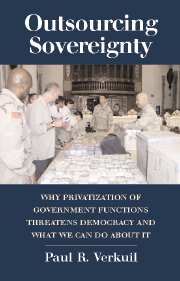 Outsourcing Sovereignty
Outsourcing Sovereignty Book contents
- Frontmatter
- Contents
- Acknowledgments
- Chart
- 1 Introduction and Overview – Why Outsourcing Threatens Democracy
- 2 The Outsourcing of Sovereignty
- 3 Case Study: Public and Private Approaches to Transportation Security
- 4 The Public-Private Distinction
- 5 The Case for Constitutional Governance
- 6 Statutory and Administrative Limitations on Private Delegations
- 7 Outsourcing Government Services: Contract Theory and Practice
- 8 Structural Reforms to Government
- 9 Conclusions (Wherein the Principal Instructs Her Agents)
- Cases
- Bibliography
- Index
3 - Case Study: Public and Private Approaches to Transportation Security
Published online by Cambridge University Press: 27 July 2009
- Frontmatter
- Contents
- Acknowledgments
- Chart
- 1 Introduction and Overview – Why Outsourcing Threatens Democracy
- 2 The Outsourcing of Sovereignty
- 3 Case Study: Public and Private Approaches to Transportation Security
- 4 The Public-Private Distinction
- 5 The Case for Constitutional Governance
- 6 Statutory and Administrative Limitations on Private Delegations
- 7 Outsourcing Government Services: Contract Theory and Practice
- 8 Structural Reforms to Government
- 9 Conclusions (Wherein the Principal Instructs Her Agents)
- Cases
- Bibliography
- Index
Summary
The previous chapter set out a variety of situations in which contractors have been doing work that government officials should perform themselves or at least that Congress should expressly permit to be delegated to the private sector. It may seem that all public activities are moving from government to contractors. But sometimes it is in the other direction. This chapter looks more closely at public and private solutions to transportation security.
AN INTRODUCTION TO TRANSPORTATION SECURITY
A major aspect of national security involves transportation to, from, and within U.S. borders. The events of September 11 cruelly highlighted weaknesses in our airport security system. And port security remains an ongoing problem, even though no catastrophic event has yet occurred. In both situations, the private sector plays or has played important security roles, whether as owners of facilities or as contractors directly managing security services.
National security sweeps far more broadly than transportation security, of course, but it shares with transportation security the use of public officials and private contractors to achieve security goals. Privatization of military functions, for example, raises troubling questions about converting vital security functions to private control. The transportation security function has similar implications for privatization.
Privatization of airport security also raises comparative questions because there are marked differences in approach between the United States and its European allies. In European countries, security inspections themselves are often done by private contractors. But in the United States, government control of airport security has become the norm after 9/11.
- Type
- Chapter
- Information
- Outsourcing SovereigntyWhy Privatization of Government Functions Threatens Democracy and What We Can Do about It, pp. 57 - 77Publisher: Cambridge University PressPrint publication year: 2007


